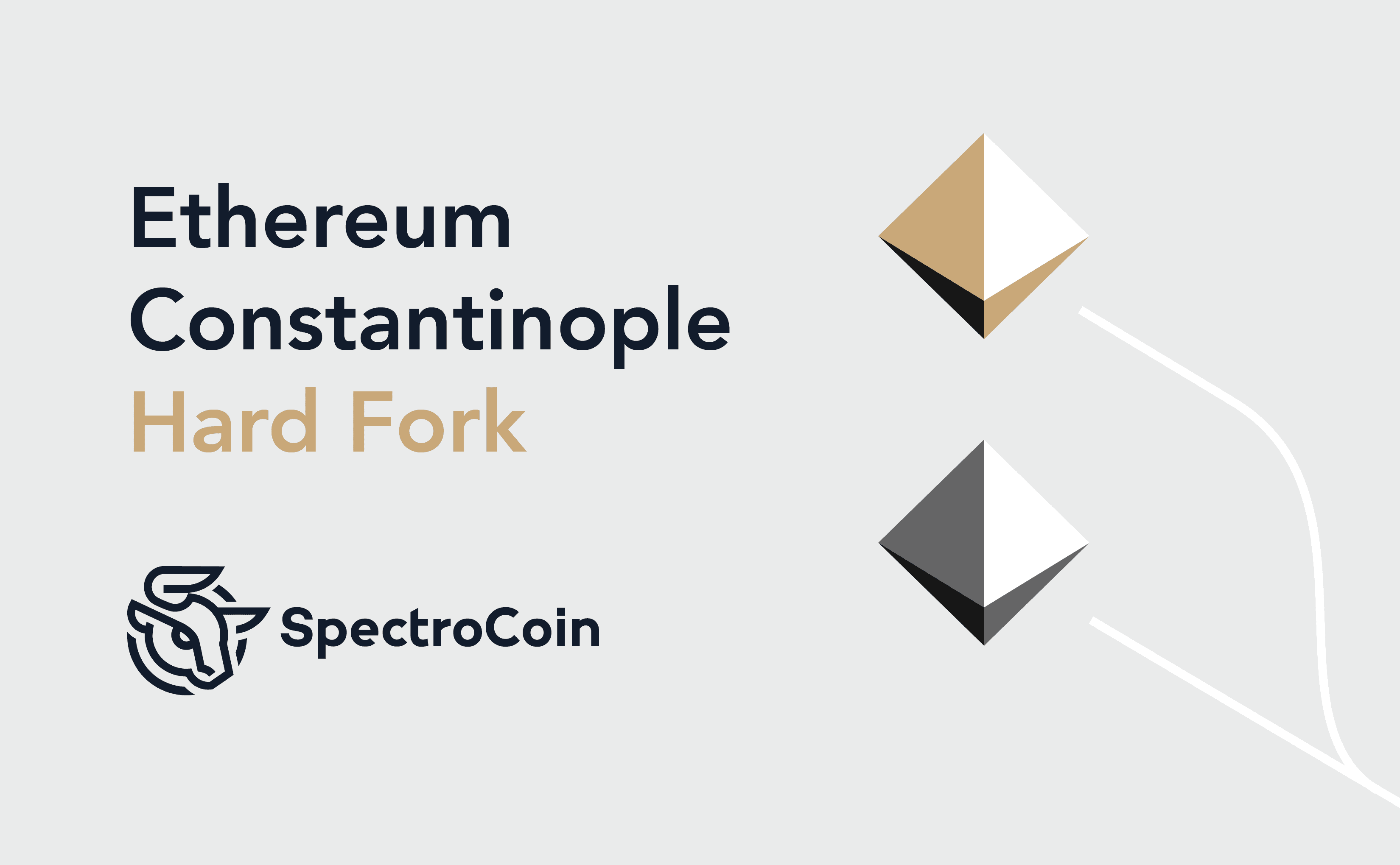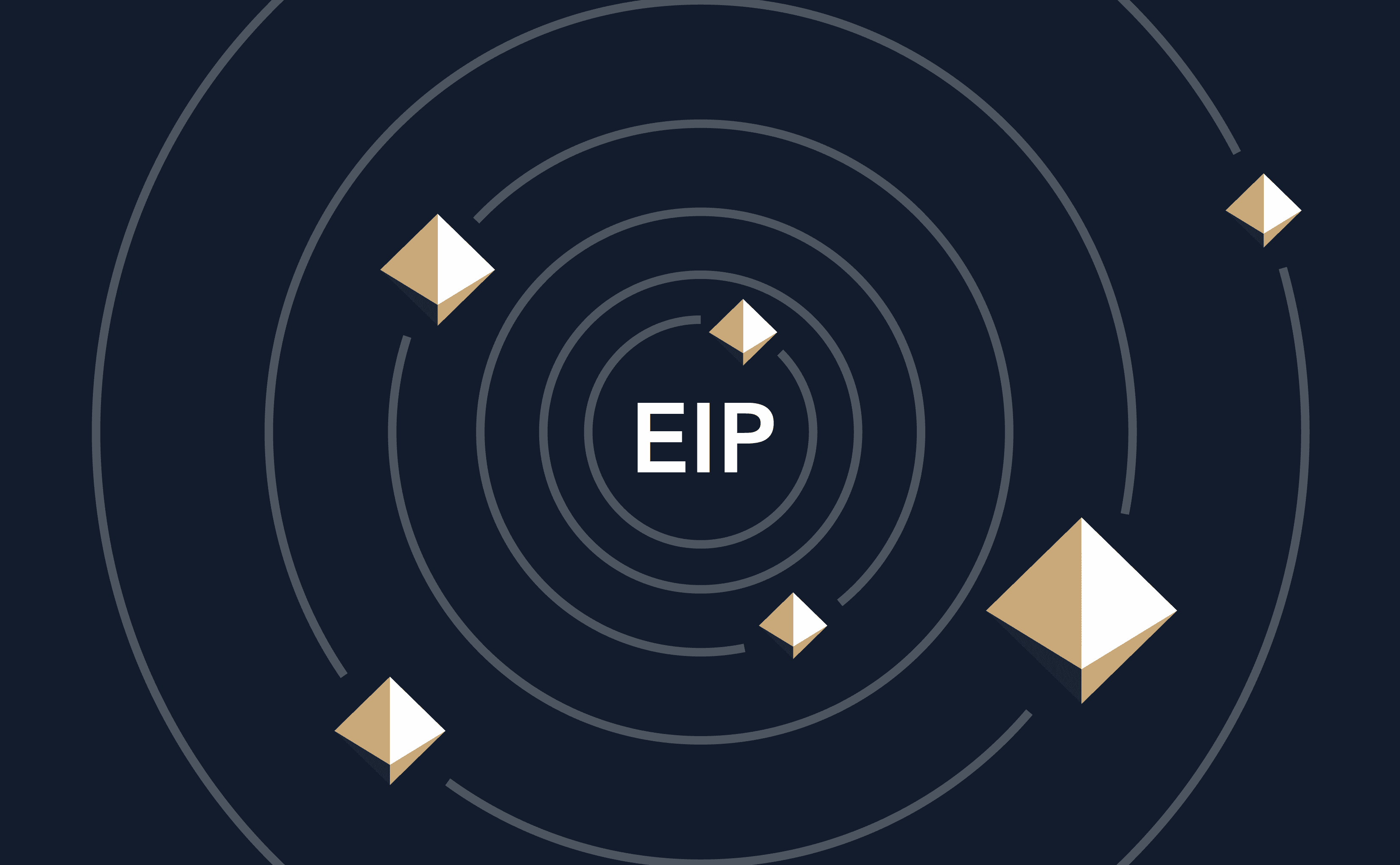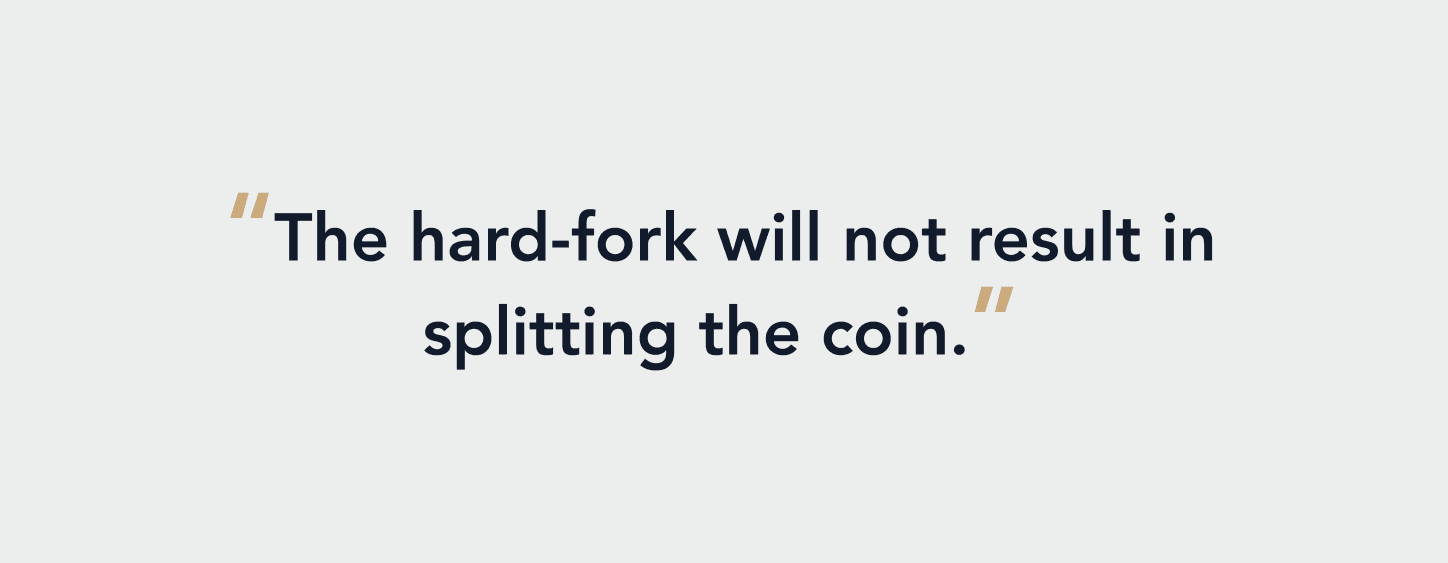SpectroCoin is Ready to Support ETH Constantinople Hard Fork
SpectroCoin and its community is eagerly awaiting the Ethereum's Constantinople hard fork. The ultimate goal of this improvement is to move from a Proof-of-Work to a Proof-of-Stake protocol, which will help to solve scalability and mining issues on the Ethereum network. The hard fork must be unilaterally implemented across all nodes in the Ethereum blockchain to function as intended. We would like to walk you through the upcoming changes and updates.

Blockchain rules: forks
Usually, people associate the term “fork” with releasing new coins to the network, but in the crypto-dictionary “fork” should be defined as a split of the original chain into two new chains that exist independently. Most of the crypto market participants are used to Contentious Forks - a democratic approach which allows users to choose to either stay with the original chain (if they do not agree with the software changes) or implement the new updates.
The Ethereum network has already gone through multiple planned and unplanned hard forks, and you can learn more about them here. The constant improvements of the Ethereum blockchain allowed Ether to gain a warm spot among top cryptocurrencies. Now, the Constantinople hard fork is the next one being implemented and it seems to be the most awaited upgrade by the crypto community so far.
The Ethereum Constantinople hard fork is unanimously supported by major players within the ETH ecosystem, which means that developers, miners and Ether holders are swiftly switching to the updated blockchain version.
Proof-of-Work vs. Proof-of-Stake
In the crypto world, the Proof-of-Work (PoW) and Proof-of-Stake (PoS) concepts are consensus mechanisms which are important for validating transactions on a block. In order to confirm Ether, bitcoin or other altcoin transactions on the blockchain, the consensus must be reached without participation of a third party or central authorities. Decentralised consensus across the network is reached through a process called mining.
Currently, Proof-of-Work is used as the main validator to prove the authenticity of the work. Although Proof-of-Work benefits miners by rewarding them with coins for their work, it has its downsides. The biggest issue is that mining requires a lot of electric power and expensive computing hardware. Also, more limitations apply to the amount of transactions that can be processed at the same time.
As a result, some of the popular cryptocurrencies, Ethereum included, are determined to shift to the Proof-of-Stake model. This model applies randomized-consensus algorithms to reach consensus and validate transactions on a block.
Basically, the PoS system requires validators to show ownership of a certain number of cryptocurrency units (stakes) in order to vouch for a block. Consequently, expensive hardwares are eliminated from the picture, electricity consumption is decreased and validations are faster.

The Ethereum Constantinople hard fork
The upgrade consists of 5 unique Ethereum Improvement Proposals (EIPs). Each of them will have a huge impact on the Ethereum code and will improve processing times, scaling, cost and the overall experience for Ether holders. The following section will explore the upcoming improvements in the Ethereum ecosystem.
Ethereum improvement proposals
The implementation of Ethereum improvement proposals into the Ethereum blockchain brings the ecosystem one step closer to the Serenity hard fork, a transition from a Proof-of-Work model to a Proof-of-Stake distributed consensus.
EIP 145: Efficiency & Speed - The modification of the Ethereum Virtual Machine will improve the speed of operations and will allow them to be executed more efficiently. This means that some of the activities on the chain will be accomplished faster, cheaper and easier than before.
EIP 1014: Scalability - This EIP will offer a scaling solution based on off-chain transactions. 4 stack arguments - endowment, memory_start, memory_length, salt - will be added to the code, which will enable transactions to be sent to the addresses that currently do not exist on-chain but, due to a particular piece of code, can be relied on, and transactions will be credited when a specific address is created.
EIP 1052: Speed & Energy - This EPI focuses on smart contract’s code verification improvement. In other words, the Constantinople hard fork allows the optimization of large-scale smart contract execution on the Ethereum blockchain. Now, in order to complete smart contract verification, you will need to pull the hash of a contract’s bytecode, not the entire code itself. Verification will be quicker, as less processing power will be used.
EIP 1283: Cost - This implementation upgrades smart contracts’ storage and reduces excessive gas cost. The proposal cuts off gas costs depending on net gas metering changes and mismatches of the implementation works.
Editor's note: because of a vulnerability discovered in January 2019, the EIP 1283 will not be included in the Constantinople hard fork.
EIP 1234: Bomb Delay and Block Rewards - This EPI solves two current issues: firstly, it will reduce the block reward from 3 Ethers per block to 2 Ethers. This, in turn, will result in a reduction of the total supply of new ETH and decrease the inflation rate.
Secondly, it will delay the difficulty bomb for approximately one year and allow the Ethereum community to prepare for the Proof-of-Stake model. The term “Bomb” is known as Ethereum mining difficulty, a process that leads to higher consumption of resources when mining a new block and makes the process itself unprofitable.

SpectroCoin’s tips
Taking into account previous forks, SpectroCoin recommends you to be extra careful about the buzz around them. This is the perfect opportunity for fraudsters to fish for people’s private keys and personal information, steal their funds or trick them with an offer too good to be true.
We just want to warn our customers that there will be no free airdrops or free tokens due to the Constantinople Hard Fork. If you see sites or notifications that claim otherwise, you can be sure that they are trying to exploit uninformed ETH holders.
As a SpectroCoin Ethereum wallet holder, you should note that no preparation from your side is needed for the new fork. The Constantinople update will affect Ethereum blockchain, but should not be noticeable to Ether holders.
The upgrade will not affect daily ETH operations such as selling, buying, and exchanging on SpectroCoin’s platform or Android and iOS apps. Nethertheless, we kindly recommend that you do not move (deposit/withdraw) your funds until the Constantinople update is completed.
What are your thoughts on the Constantinople hard fork? Leave your comments on SpectroCoin’s social channels, we would love to hear them!